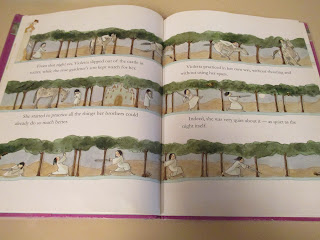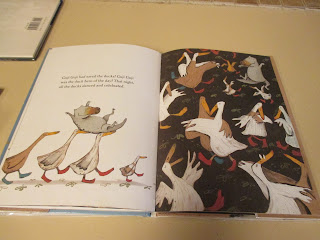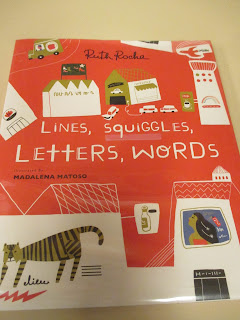I’m back again today with some more of my favorites! For this set, it was really about a unique element of the story itself that caught my attention. From a way to subtly teach math, to a story about a more than capable princess, to a lesson on the importance to being who you are, to a book that warmed my heart with how well it represents the world around us, these were four that left their mark on me in significant ways. So without further ado…
Author: Jean-Luc Fromental
Illustrator: Joelle Jolivet
Translated by: Maggie Lehrman
What would you do if, on the first day of the year, a penguin showed up on your doorstep, complete with instructions to “feed me when I’m hungry”? What if that penguin was then joined by 364 of his closest friends, one each consecutive day that followed? Where would you put them? How would you feed them? And where on Earth are they coming from?
This over-sized picture book from French author Jean-Luc Fromental reminded me of a childhood favorite of mine, Mr. Popper’s Penguins. (The book, definitely not the movie.) But I thought Fromental’s tale offered a unique twist. A family of four seem to be minding their own business when day after day, penguins keep showing up at their door with instructions to care for and feed them. At first, like many of us might be I’m sure, they’re delighted with their black and white bird friends as houseguests. But if the saying goes that after three days houseguests, like fish, begin to stink, you can imagine how problematic it might become if that’s your visitor's favorite meal.
What made this book memorable for me (other than indulging a dream to host a few web-footed friends of my own) was how the family problem solves strategies on how to contain their ever-expanding brood (or a raft, rather, as that is the correct term for a group of penguins). Mathematical concepts such as addition, multiplication, division, organization into sets and even cubes are used to track, maintain and classify the family’s guests. The fun storyline and the humor regarding problems the family must combat (the smell!) keep the math from becoming a strictly didactic feature of the text.
The illustrations, done by Joelle Jolivet, as you can imagine are mostly black and white, accented by orange, blue and grey. It’s a limited color palette that used purposefully including to set one penguin out among the masses by giving him blue feet. “Chilly” adds a seek and find element to much of the second half of the book, where the pages are populated with penguins.
I don’t want to spoil the ending and the fact that this book has been recently reiussed should make it a tad easier to get your hands on a copy, something I highly recommend doing. Additionally, though I haven’t had a chance to check them out myself, Fromental and Jolivet collaborated on a few other titles, including Oops! which features the family from 365 Penguins and Bonesville.
By: Cornelia Funke
Illustrated by: Kerstin Meyer
Translated by Anthea Bell
As I’m currently raising a strong-willed, independent seven (almost eight!) year old girl, stories that resonate that “girl power” vibe tend to stand out. To be clear, not just to share with my daughter, but my son as well, so that they are both exposed to strong female characters. This, and the other works by German author Cornelia Funke are among my favorites as her female characters are not only strong but spunky, (a word that has often been used to describe my Bean) but she constantly shows they thriving is very non-conventional roles. I adore her book Pirate Girl, as well, but it is The Princess Knight that landed on my favorites list.
The story reads much like a fairy tale, complete with some familiar tropes, such as the childbed death of the Queen. Her untimely demise leads to the King deciding to raise the newborn Princess, Violetta, just like her three older brothers. She’s tiny and not nearly as strong as her brothers, who are unrelenting in their teasing and superiority complexes as Violetta struggles to keep up. But the Princess is determined, sneaking out to practice her jousting skills in the middle of the night eventually earning the respect of her older brothers when her skills begin to surpass their own.
True to fairy tale lore, though, the place of Violetta has been predetermined, and the King announces a joust with the grandest prize of all; the hand of the Princess in marriage. Violetta wants no part in it and her refusal leads the angry King to lock her in a tower. Her youngest brother visiting offers to help, but Violetta simply answers, “I better see to it myself.”
I won’t spoil this one either, other than to say that “happily ever after” does come into play, solely at Violetta’s own hand. I’m a sap for fairy tales, but the ‘damsel in distress’ angle is often grating to my modern sensibilities. I appreciate how Funke interweaves all the elements readers cherish in those classic tales with a strong, realistic heroine.
It’s also worth mentioning the superb work of the translator, Anthea Bell. In the world of translation into English, Bell is a legend. She is best known for translating from Dutch, French and German and has seven (yes seven!) books to her credit that have won the Batchelder award. Honestly, if it hadn’t been on the title page or if I hadn’t already been familiar with the fact that Funke was German, I never would have guessed that this was a translated book.
As I mentioned if you like the strong female Funke uses as the main character in many of her stories, Pirate Girl is another great one to check out – especially for pirate Molly’s mother and shipmates. Funke has also written a number of novels, most of which have been translated into English. Noah really enjoyed her Inkspell trilogy, which was also made into a motion picture. My favorite part of Funke’s work is her ability adapt a genre to meet today’s needs.
By: Chih-Yuan Chen
Translated by: Hsin Yi Publications (original publisher)
I mentioned in the “Lost” category that the picture book industry in China is fledgling compared to the industry in the United Sates and most of Europe. This means that we see very few translated titles from that part of the World. With that in mind, I’m delighted to share Guji Guji, from Taiwanese author Chih-Yuan Chen, here with some of my other favorites. This story, which reminded me a bit of Hans Christian Andersen’s “The Ugly Duckling,” is all about being true to who you are and the importance of family.
One night, an oversized egg rolls into Mother Duck’s nest without her noticing (because she’s reading!). When the first three ducklings, so perfectly named Crayon, Zebra, and Moonlight hatch, they’re joined by ‘a rather odd-looking duckling’ from the fourth egg who greets them with “Guji-Guji’ which becomes his name. Young readers will be quick to note that the ‘odd-looking duckling’ is actually a baby crocodile! But Mother Duck and the others either don’t notice or don’t care. Guji-Guji learns to swim, waddle and dive with the rest of them, often better than the rest. Though “no matter how quick they were, or what they looked like, Mother Duck loved all her ducklings the same.”
When Guji-Guji encounters three crocodiles one day, they taunt and tease him for thinking he’s a duck. No matter how many physical characteristics the crocodiles point out they share with Guji-Guji, he remains insistent that he IS a duck. They try to convince him to help them eat the duck family since he is ‘one of them.’ Lost and alone, Guji-Guji must decide who he truly is and how to protect those he loves.
Of course, Guji-Guji saves the day but you’ll want to read this one for yourself to find out how “every day he became a stronger and happier “crocoduck”.” Like the previous two book’s ability to weave in a deeper meaning without being heavy-handed with the moral or lesson, I love the message readers will take away from Guji-Guji. I also appreciated the creative extra details such as the names of the ducklings, the toy duck on a string Guji-Guji leads everywhere and the muted color pattern that felt slightly reminiscent of a swamp, especially when the crocodiles come into the story. As I mentioned with Funke’s work, that ability to modernize with a new spin on elements of classic tales is something I really appreciate and made this an easy choice to include with my favorites.
(Kristi’s side note: There is a note in the back of the book from Chen, saying that the story was inspired by a friend who had been adopted, who had felt isolated and alone growing up where he looked different. Yuan goes on to say it is his hope “that children from all over the world can learn to accept different people and things and see the world with broader views and minds.” A few of the reviews and insights to the book I found when I was researching mentioned that casting Guji Guji’s biological family (the crocodiles) as evil and frightened is problematic in terms of it being a story about adoption. I’m mentioning it here because I do think it’s a valid point but that thought honestly did not cross my mind when I read it, I was much more struck by how assured Guji Guji was in who he was and the love he received from Mother Duck and his siblings.)
By: Bob Graham
Though not translated since author/illustrator Bob Graham hails from Australia, I was so touched by A Bus Called Heaven, that there was no way I could leave it off this list. I have read many of Graham’s books (My animal lover, Noah, strongly lobbied for How To Heal A Broken Wing and Mikayla loved the fairies in April & Esme Tooth Fairies) but there were a few things that made this one stand out amongst them for me.
When an abandoned bus, with its destination set as ‘heaven’ ends up on the street in Stella’s neighborhood, changes begin to happen. Though no one knows where the bus came from or why it’s there, Stella decides that together the community can “make it OURS.” With the help of her very eclectic community, the bus beings to change before Stella’s eyes. People begin to use the bus as a place to gather and enjoy each other’s company. Like the bus, the community itself begins to transform.
That is until one day when a tow truck arrives with instructions to return the bus to a junkyard as it’s creating an obstruction and is against city regulations. The community follows the bus to the junkyard, pleading for it not to be crushed, but to no avail. Stella then offers the junkyard boss a deal; a game of table soccer where the winner keeps the bus. When he asks her why he should play, she shares that there are sparrows nesting in the engine (which a keen-eyed viewer may have spotted in an earlier illustration!). I won’t ruin the details of exactly how it all goes down, but this one has a happy ending for Stella and her neighbors.
I mentioned that Stella’s neighborhood is “eclectic” and it is one of the things that made this one memorable for me. In a thirty-six-page picture book, Graham pays a lot of attention to providing a diverse and unique cast of characters. His illustrations are full of different skin colors and styles of clothing unique to specific cultures, and he also uses names in the text that reflect of the cast he has created. From babies to the elderly, Graham shows his characters interacting and appreciating each other. I couldn’t pinpoint the location of the book (other than a neighborhood in a large city) and I loved that any kid could pick this book up and see themselves and others they may not represented. In the classic children’s lit analogy, I thought this book was a wonderful representation of both a window and a mirror.
Admittedly, there are some gaps in the story that go unexplained, but there was so much good and positive that warmed my heart with this text that I could easily forgive small inconsistencies. This is a book we need right now, one that shows when we peacefully come together, we can inspire change and growth. It is a book that shows we are more together than we are on our own.
Honorable Mentions: So beyond the ones listed above, here are a few more that I think are worth checking out for their story-telling elements.
By: Jean Leroy
Illustrated by: Matthieu Maudet
If you like reimagined fairy tales, this one from French author Jean Leroy this one made me laugh at the trouble that befalls a wolf on his first hunting trip when his prey isn’t quite as honorable as he is.
By: Sue deGennaro
Friendship can be tough and I Australian author Sue deGennaro tackles it brilliantly in this book about a little boy who likes to dress up as animals and his friend Camille, who looks at the world slightly differently.
By: Ruth Rocha
Illustrated by: Madalena Matoso
The story of a young boy learning how to read by Brazilian author Ruth Rocha intrigued me from the beginning.
Also, though I discussed them extensively in previous posts, I would highly recommend Celia as well as both The Tiny King and The Big Princess. I’ll be back on Tuesday with one more post with some of my favorites. I can’t believe how close we are to the end! See you back here next week!





















Kambi Casino Review 2021 - Top Promo Code for
ReplyDeleteKambi Casino is a new online casino operated by Kambi-based gaming 1xbet provider, หาเงินออนไลน์ offering an excellent gaming experience for players. The casino 온카지노 has a Rating: 2 · 1 review